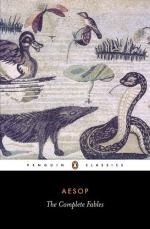THE PARTRIDGE AND THE FOWLER
A Fowler caught a Partridge in his nets, and was just about to wring its neck when it made a piteous appeal to him to spare its life and said, “Do not kill me, but let me live and I will repay you for your kindness by decoying other partridges into your nets.” “No,” said the Fowler, “I will not spare you. I was going to kill you anyhow, and after that treacherous speech you thoroughly deserve your fate.”
THE RUNAWAY SLAVE
A Slave, being discontented with his lot, ran away from his master. He was soon missed by the latter, who lost no time in mounting his horse and setting out in pursuit of the fugitive. He presently came up with him, and the Slave, in the hope of avoiding capture, slipped into a treadmill and hid himself there. “Aha,” said his master, “that’s the very place for you, my man!”
THE HUNTER AND THE WOODMAN
A Hunter was searching in the forest for the tracks of a lion, and, catching sight presently of a Woodman engaged in felling a tree, he went up to him and asked him if he had noticed a lion’s footprints anywhere about, or if he knew where his den was. The Woodman answered, “If you will come with me, I will show you the lion himself.” The Hunter turned pale with fear, and his teeth chattered as he replied, “Oh, I’m not looking for the lion, thanks, but only for his tracks.”
THE SERPENT AND THE EAGLE
An Eagle swooped down upon a Serpent and seized it in his talons with the intention of carrying it off and devouring it. But the Serpent was too quick for him and had its coils round him in a moment; and then there ensued a life-and-death struggle between the two. A countryman, who was a witness of the encounter, came to the assistance of the Eagle, and succeeded in freeing him from the Serpent and enabling him to escape. In revenge the Serpent spat some of his poison into the man’s drinking-horn. Heated with his exertions, the man was about to slake his thirst with a draught from the horn, when the Eagle knocked it out of his hand, and spilled its contents upon the ground.
One good turn deserves another.
THE ROGUE AND THE ORACLE
A Rogue laid a wager that he would prove the Oracle at Delphi to be untrustworthy by procuring from it a false reply to an inquiry by himself. So he went to the temple on the appointed day with a small bird in his hand, which he concealed under the folds of his cloak, and asked whether what he held in his hand were alive or dead. If the Oracle said “dead,” he meant to produce the bird alive: if the reply was “alive,” he intended to wring its neck and show it to be dead. But the Oracle was one too many for him, for the answer he got was this: “Stranger, whether the thing that you hold in your hand be alive or dead is a matter that depends entirely on your own will.”




